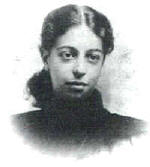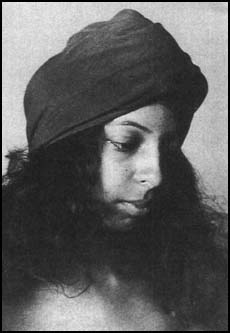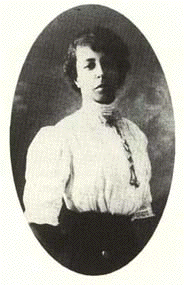Angelina Weld Grimke
Angelina Weld Grimké was born on February 27,
1880 in Boston, the only child of Archibald Grimké and Sarah
Stanley who was from a prominent white family. Angelina
had a mixed racial background; her father was the son of a white
man and a black slave, and her mother was from a prominent white
family. Her parents named her after her great aunt Angelina
Grimké Weld, a famous white abolitionist and women's rights
advocate.
When Grimké was three years old, her mother left her father,
taking her daughter with her. After four years she returned
Angelina to her father and the child never saw her mother again.
Archibald, Angelina's father, was a well known lawyer who was
the executive director of the NAACP. Angelina was able to attend
one of the finest schools in Massachusetts, the Carleton Academy
in Ashburnham.
After high school, she went to the Boston Normal School of
Gymnastics, and graduated in 1902 with a Physical Education
degree. She worked as a gym teacher until 1907. She moved to
Washington D.C. and became an English teacher at Armstrong
Manual Training School, later transferring to Dunbar High
School. She finally retired in 1926.
During her teaching career, she wrote poetry, fiction, reviews,
and biographical sketches. She became best known for her play
entitled "Rachel." The story centers around an African-American
woman (Rachel) who rejects marriage and motherhood. Rachel
believes that by refusing to reproduce, she declines to provide
the white community with black children who can be tormented
with racist atrocities. "Rachel" was the only piece of
Angelina's work to be published as a book; only some of her
stories and poems were published, primarily in journals,
newspapers, and anthologies.
Only her poetry reveals Angelina's romantic love toward women.
The majority of her poems are love poems to women or poems about
grief and loss. Some (particularly those published during her
lifetime) deal with racial concerns, but the bulk of her poems
are about other women, and were unlikely to be published for
this reason. Only about a third of her poetry has been published
to date.
 Angelina's
journal and letters reveal her lesbian tendencies from teenage
years. At sixteen, she wrote to Mamie Burrill: "I know you are
too young now to become my wife, but I hope, darling, that in a
few years you will come to me and be my love, my wife! How my
brain whirls how my pulse leaps with joy and madness when I
think of these two words, 'my wife.'" But, despite Angelina's
great passion, she kept her desires closeted throughout her
life, trying to live up to her father's idea of morality. Her
writing shows the effect self-denial had upon her, revealing her
sorrow over her inability to find the female companionship that
she so deeply desired.
Angelina's
journal and letters reveal her lesbian tendencies from teenage
years. At sixteen, she wrote to Mamie Burrill: "I know you are
too young now to become my wife, but I hope, darling, that in a
few years you will come to me and be my love, my wife! How my
brain whirls how my pulse leaps with joy and madness when I
think of these two words, 'my wife.'" But, despite Angelina's
great passion, she kept her desires closeted throughout her
life, trying to live up to her father's idea of morality. Her
writing shows the effect self-denial had upon her, revealing her
sorrow over her inability to find the female companionship that
she so deeply desired.
Grimké also wrote several short stories, such as "The Closing
Door." This story reflects the feelings of loneliness and
isolation she felt after her mother left her. The main character
in the story is a fifteen year old girl who is also left by her
mother. She is shuffled from foster home to foster home, ending
up with a woman whom she loves as a mother and who loves her.
The story does not have a happy ending, however, because the
mother figure dies, leaving the main character exactly as she
was at the beginning.
When considering the sizable body of work Angelina Grimke
produced, it is instructive to note that very little of her work
was published. The times were not friendly to a person such as
Ms. Grimke. Not only was it difficult for a Black woman to be
published, but the fact that she was a Black lesbian woman at a
time when such sexuality was not spoken of or in any way
acceptable made it that much more difficult with regard to
publication.
In 1930, after her father died, Angelina Grimke moved to New
York and published nothing more. She lived there in seclusion and died on June 10,
1958.
nothing more. She lived there in seclusion and died on June 10,
1958.
Ms. Grimke was never considered to be among the first echelon of
Harlem Renaissance poets. She had been published before the
Renaissance began and was looked upon as a forerunner of the
actual creative awakening. Alain Locke acknowledged her role as
a significant transitional figure, as a pioneer and path-breaker
from whom the "artistic vanguard" inherited "fine and dearly
bought achievements".
Grimké's writings have been noticed by several critics including
Gloria Hull. She writes of Grimké in her book Color, Sex and
Poetry, saying that "being a black lesbian poet in America at
the beginning of the twentieth century meant that one wrote (or
half wrote)-- in isolation.... It meant that when one did write
to be published, she did so in shackles-- chained between the
real experience and convention that would not give her voice."
Rosabel
I
Leaves, that whisper, whisper ever,
Listen, listen, pray;
Birds, that twitter, twitter softly,
Do not say me nay;
Winds, that breathe about, upon her,
(Since I do not dare)
Whisper, twitter, breathe unto her
That I find her fair.
II
Rose whose soul unfolds white petaled
Touch her soul rose-white;
Rose whose thoughts unfold gold petaled
Blossom in her sight;
Rose whose heart unfolds red petaled
Quick her slow heart's stir;
Tell her white, gold, red my love is;
And for her,--for her.
You
I love your throat, so fragrant, fair,
The little pulses beating there;
Your eye-brows' shy and questioning air;
I love your shadowed hair.
I love your flame-touched ivory skin;
Your little fingers frail and thin;
Your dimple creeping out and in;
I love your pointed chin.
I love the way you move, you rise;
Your fluttering gestures, just-caught cries;
I am not sane, I am not wise,
God! how I love your eyes!
Naughty Nan
I
Naughty Nan
If you can
Tell me how your frowns and smiles,
Sudden tears, and naive wiles,
Linked into a glittering band
Follow swiftly hand in hand?
Tell me wayward April-born,
Child of smiles and tears forlorn,
Have you ever felt the smart
Of a lacerated heart?
Are you but a sprite of moods?
Heartless, that fore'er deludes
Tell me naughty Nan?
II
Naughty Nan
If you can
Tell me why you have such eyes
Gleaming when not drooped in sighs
Or when veiled by falling rain?
Haughty oft but never vain
Sometime wistful orbs of brown,
Sometimes blazing in fierce scorn
But eyes that are never free
From some glance of witchery.
Tell me why you have such lips
Tempting me to stolen sips
Tender, drooping, luring, sad,
Laughing, mocking, madly glad,
Tell me naughty Nan?
III
Naughty Nan
If you can
Tell me why you play with me,
Take my heart so prettily
In your dainty, slender, hands,
Bruise its tender, loving, bands?
Tell me why your eyes are brown
Mock and glitter when I frown?
Flitting, luring, little, sprite
In a garb of moods bedight,
Dancing here, and dancing there,
Changeling strange, but ever fair
You have caught me in your snare,-
Naughty Nan.
At April
Toss your gay heads,
Brown girl trees;
Toss your gay lovely heads;
Shake your downy russet curls
All about your brown faces;
Stretch your brown slim bodies;
Stretch your brown slim arms;
Stretch your brown slim toes.
Who knows better than we,
With the dark, dark bodies,
What it means
When April comes alaughing and aweeping
Once again
At our hearts?
When the Green Lies Over the Earth
When the green lies over the earth, my dear,
A mantle of witching grace,
When the smile and the tear of the young child year
Dimple across its face,
And then flee, when the wind all day is sweet
With the breath of growing things,
When the wooing bird lights on restless feet
And chirrups and trills and sings
To his lady-love
In the green above,
Then oh! my dear, when the youth's in the year,
Yours is the face that I long to have near,
Yours is the face, my dear.
But the green is hiding your curls, my dear,
Your curls so shining and sweet;
And the gold-hearted daisies this many a year
Have bloomed and bloomed at your feet,
And the little birds just above your head
With their voices hushed, my dear,
For you have sung and have prayed and have pled
This many, many a year.
And the blossoms fall,
On the garden wall,
And drift like snow on the green below.
But the sharp thorn grows
On the budding rose,
And my heart no more leaps at the sunset glow,
For oh! my dear, when the youth's in the year,
Yours is the face that I long to have near,
Yours is the face, my dear.
The Eyes of My Regret
Always at dusk, the same tearless experience,
The same dragging of feet up the same well-worn path
To the same well-worn rock;
The same crimson or gold dropping away of the sun
The same tints, – rose, saffron, violet, lavender, grey
Meeting, mingling, mixing mistily;
Before me the same blue black cedar rising jaggedly to
a point;
Over it, the same slow unlidding of twin stars,
Two eyes, unfathomable, soul-searing,
Watching, watching, watching me;
The same two eyes that draw me forth, against my will
dusk after dusk;
The same two eyes that keep me sitting late into the
night, chin on knees
Keep me there lonely, rigid, tearless, numbly
miserable –
The eyes of my Regret.
Your Eyes
Through the downiness of the grey dawn,
Through its grey gossamer softness -
Your eyes;
Through the wonder-shine of the one star,
Beautiful, solitary, in the East -
Your eyes;
Through the fierceness, the cymbaling of colors,
Through the whitening glory of the springing sun-
Your eyes;
Through the chattering of birds, through their songs,
Delicate, lovely, swaying in the treetops,
Through the softness of little feathered breasts and throats
Through the skitterings of little feet,
Through the whirrings of silken wings -
Your eyes;
Through the green quiet, the hot languor of noon,
Sudden, through its cleft peace-
Your eyes;
Through the slenderness of maiden trees kissed aflame by the
mouth of the Spring,
Through them standing against a slowly goldening Western sky,
Through them standing very still, wondering,
Wistful, waiting -
Your eyes;
Through the beautiful Dusk; through the beautiful, blue-black
hair of the Dusk,
Through her beautiful parted hair -
Your eyes ,
Kissing mine.
- Angelina Weld Grimke

Source:
Biographical writing copyright 1995 Alexandria North
Graphics and website design copyright 1999 Northern Impressions
1.
http://www.sappho.com/poetry/historical/a_grimke.html
2.
http://voices.cla.umn.edu/authors/AngelinaWeldGrimke.html
3.
http://www.english.uiuc.edu/maps/poets/g_l/grimke/herron.htm
4.
http://www.dclibrary.org/blkren/bios/grimkeaw.html
Author: Grimké, Angelina Weld, 1880-1958
Title: Papers, 1887-1958
Description: 8 linear ft.
Notes: Author and educator. Includes Grimké's diaries, and
manuscripts of
her writings, including "Mara." Also contains correspondence,
notebooks, financial papers, and educational material.
Gift, 1960.
Subjects: Authors; Grimké, Angelina Weld
Location: Howard University, Moorland-Spingarn Research Center
(Washington, D.C.)
NIDS Fiche #: 4.72.43
NUCMC Number: MS 62-4106